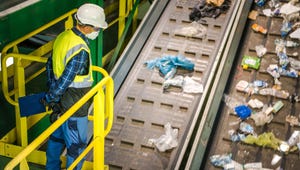With a veteran from the $14-billion wood-pallet industry as its CEO, Intelligent Global Pooling Systems (iGPS; Cos Cob, CT) is pushing plastics pallets with integrated radio frequency identification (RFID) tags through a rental model, where shippers could use them without the full cost of buying, maintaining, and storing them.
April 7, 2006
With a veteran from the $14-billion wood-pallet industry as its CEO, Intelligent Global Pooling Systems (iGPS; Cos Cob, CT) is pushing plastics pallets with integrated radio frequency identification (RFID) tags through a rental model, where shippers could use them without the full cost of buying, maintaining, and storing them.
Bob Moore will act as CEO of iGPS, after earlier serving as CEO of CHET, the largest wood-pallet pool. In a release, iGPS estimated that there are currently one billion pallets in circulation, and of the 600-million new pallets that enter the market annually, 97% are wood, giving plastic pallets room for growth.
With private backing from Pegasus Capital Advisors LP, iGPS will offer plastic pallets that weigh roughly 30% less than their wood counterparts and feature integrated RFID tags, which are gaining increased interest from companies, as well as the U.S. Department of Defense, interested in keeping closer tabs on their global shipping.
In a telephone interview, Moore said the company will use a broad range of manufacturers, but that it currently has six suppliers lined up. Although it''s tried multiple technologies, including structural foam molded pallets, Moore said the company has been most impressed with injection molded models.
The pallets will feature a central pocket where, after molding, an encased RFID tag can be inserted, associating a specific bar code with the pallet that is protected from either vandalism or shipping damage. If the code needs to be changed or the chip replaced, a plastic rivet can be removed, freeing the RFID tag from its base.
The tag itself is passive, meaning it''s only activated if it passes through a sensor, versus active battery-powered models that emit a signal continuously. Moore said the pallets feature a reader range of 10m.
In addition to being lighter weight than wood, the plastic pallets will also be more durable. Moore says that wood pallets average 3.7 trips per year, with some time lost due to down time for repairs. The plastic version won''t need this repair time, and iGPS is conservatively estimating they''ll be good for five trips/yr. After an initial ramp up of 12 months, Moore says iGPS will be the second largest pallet pool, behind his old employer, CHET.
About the Author(s)
You May Also Like


